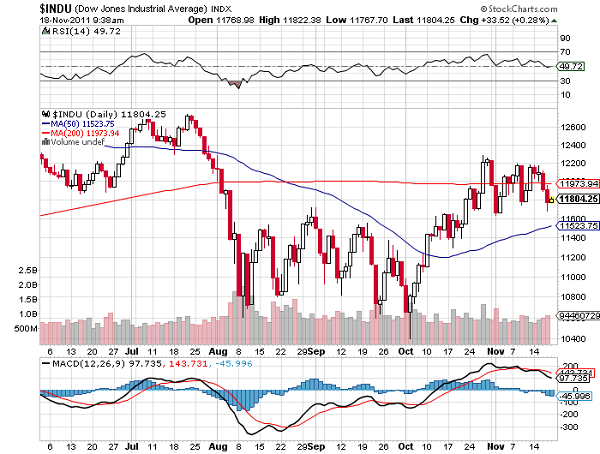The United States stock market futures pointed to a higher opening on Friday morning, in spite of vexations over the state of the European union’s lingering debt crisis and Thursday’s demonstrations seen in the United States, Italy and Greece, a few of which turned into violent clashes with law enforcement.
Futures also rose on word of the possibility of the European Central Bank lending the IMF funds to provide resources to assist larger European nations with bailouts for heavily debt-ridden nations.
Far-reaching reforms by the new Italian government in an attempt to quell the debt crisis in the Euro zone edged borrowing costs for Spain and France acutely higher, sparking the protest of tens of thousands of Greek citizens in Athens.
On Friday, the British Prime Minister David Cameron and German Chancellor Angela Merkel will meet in Berlin to discuss the continuing European debt crisis, with Merkel expected to call for a new treaty in the European union in an effort to resolve the ongoing crisis and prevent what some are referring to as a possible European financial Armageddon.
In the United States, the economy is gaining momentum, spurred by an increase in automobile manufacturing, and a slowdown in inflation which serves to relieve the pressure on spending power, and positioning the country to better withstand the European economic storm.
European Debt Crisis Sends Financial Institutions Scrambling For Hedges Against Risk
Financial institutions are in the process of some behind-the-scenes scrambling to guard their balance sheets, and mitigate their exposure to the debt crisis in Europe in an effort to ride out what is becoming an increasingly more and more frightening 2012.
In the event of an European financial Armageddon, a few of the traditional moves to hedge against risk, such as credit default swaps on sovereign debt, may prove to be ineffective in the wake of a fresh financial crisis. A possible financial collapse in Europe has caused financial institutions to load up on hedges against a possible break down, with the number of outstanding over-the-counter derivatives rising 18% in the first half of the year to a record high of $708 trillion.
Concerns that the risks stemming from the European debt crisis will be impossible to hedge away, as well as the concern that some of the hedges made by financial institutions will prove to be ineffectual have weighed heavily on the share prices of large financial institutions such as Morgan Stanley and Citigroup, even in light of the fact that the large banks have attempted to be more straight forward in disclosing information, and the insistence that they are maintaining manageable exposure to Europe.
Traditional Hedges Against Risk May Prove To Be Ineffective
The concern over the effectiveness of credit default swaps as a hedge against the fallout from a European financial meltdown stems from the issues surrounding “voluntary” debt forgiveness, an occurrence that has caused credit default swaps to be an unproductive instrument for hedging against risk.
In an attempt to avoid an outright default by Greece, policy makers in Europe are requesting that bondholders write down 50% of their debt voluntarily, taking a loss that would go uncompensated by the seller of the credit default swap, due to the fact that the write down was voluntary.
The credit default swaps that have been purchased thus-far would prove to be ineffectual if this becomes the prevailing action as the contagion spreads and insurance on debts are prevented from being paid by governments.
Analysts predict that participants in the market will be searching for additional forms of protection from risk that have terms that are clearer, although the concern remains that hedging against the risks coming from countries as large as Italy may prove to be impossible.

Comments (No)